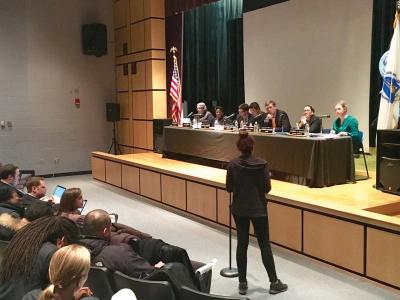February 18, 2016
 The Boston Public School Committee heard testimony from students, teachers and parents during a public hearing on proposed budget cuts at the Lilla G. Fredrick School on Feb. 9. Maddie Kilgannon photo
The Boston Public School Committee heard testimony from students, teachers and parents during a public hearing on proposed budget cuts at the Lilla G. Fredrick School on Feb. 9. Maddie Kilgannon photo
Meeting at the Lilla G. Fredrick School on Columbia Road on Feb. 9, the Boston Public School Committee held the first of three public hearings on proposed budget cuts for the upcoming fiscal year in front of an audience comprising mostly students, a few teachers, and parents.
The overall cost for running the Boston Public Schools next year will go up by $38 million (this year’s allocation is $1.014 billion) due in part to salary increases that have already been negotiated. The new budget focuses its cuts on high schools while looking to dramatically increase early childhood education.
“We are not able to guarantee that every high school in the city has what they deserve,” said Superintendent Tommy Chang. “The changes of the student weighted formula were a last resort.” He said that cuts have to be made now as the system braces for more drastic long-term changes.
The new budget — which relies on a new formula for calculating students costs—was explained during the first half of the hearing. In order to calculate how much money is allotted for each student a base weight (which in 2015 was $4,100) is multiplied by the weight of each student, which varies slightly depending on grade.
In this proposal, the weight for students in grades 9-12 will decrease from 1.3 to 1.2. The weight represents how much money the city gives to schools for each of their students. With a decreased weight for each student, the schools will get significantly less money to serve the same number of students.
The special education weight formula has also been decreased; the autism weight is set to decrease from 4.3 to 3.9. Emotional impairment will go from 3.5 for elementary school, 3.0 for middle school and high school to 2.7 for all ages. Students in inclusive settings with unknown disability will drop from 4.3 to 3.0. The result of these decreases could likely mean that class sizes will be larger.
“The weighted student formula has turned into skim milk; it’s diluted,” said City Councillor Tito Jackson after the meeting.
Jeri Robinson, a member of the school committee, asked, “Where does the gap get filled? I’m worried about the kids who won’t get what they need now.”
The budget was described as “a value statement” by nearly everyone who spoke at the hearing. Mary Lewis Pearson, a parent of BPS children, turned directly to face Rahn Dorsey, the mayor’s chief of education, as she gave her testimony. “You can tell the mayor, if this is really a statement of values, then this is immoral,” she said.
Betty O’Gara of Hurlcroft Avenue became emotional as she told the committee that when she originally moved to her Ashmont neighborhood, her children all attended the same public school. Now, she said, many neighborhood kids attend charter schools. She choked up as she added, “With the new budget, we need to be absolutely sure that we do not bifurcate our school systems.”
Currently, more than ten percent of the BPS budget is spent on transportation for public school and charter school students. With the new budget, there will be “major and aggressive changes to our transportation,” according to budget documents.The city will continue to pay for transportation to charter schools in Boston.
Chang said that he meets with the mayor every week and that the goal has been “to make sure we have a balanced budget.”


